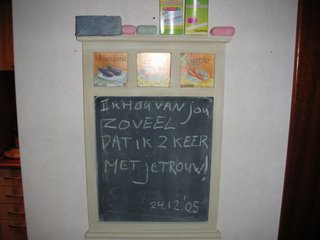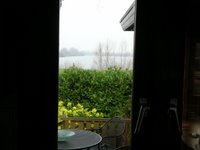Sorry for the title, but it is a fitting way to describe the multi-track, or schizophrenic, mindset you need (well, at least I do) to function properly here. Just read what follows.
As for health (thank you for asking): morale is up, but my body is not following suit. I am getting better, but I am still not well. Again I expect it to take a while tonight before I'll be able to sleep, helped by half a Lexomil and a generous serving of Scotch. Last week my morale was greatly boosted when my brains appeared not to be definitively fried out of working order by malaria, and I was able to digest information again. Then came last weekend, where we were invited to two parties, and where I felt, at least at the first one, in great shape.(*) Sunday we took it easy, so yesterday morning I entered the office as a born again public servant, ready to perform great and noble things. I tried, for the first time in three weeks, to do a full day's work, i.e. the morning plus an afternoon working session on the public finance project.
How wrong I was, again. I came home completely exhausted, depressed and, paradoxically, not able to sleep until 2 in the morning or so. This morning I failed of course to do much of substance, apart from whipping up Puppy Dog (needs to be kept on a short leash, but he's becoming more operational) and paraphing a few payments and letters. Slept very deep all afternoon.
So that's it, no more of this. I'll faithfully stick to my few-hours-of work-a-day regime, as PYL told me, until we go on leave to Holland on 18 December. My principal objective, to send out for approval the public finance reform project proposal before then, has advanced really well, so that's safe, and my boss claims he will need me in Olympic form upon my return in January, when we will have a couple of infernal weeks of reporting and programming to do.
My brother (34) is a doctor-to-be - started his medical studies at the age of 29, and just got his Masters,
cum laude, yes sir! A model of determination and discipline, and as such a source of genuine fraternal pride on my part (I fear he may find this embarrassing). He's now doing his internships. His medical network has proved quite useful as he and his wife have managed to organise a check-up for me with a malaria specialist during our leave in Holland. As one of my wealthy native country's claims to international fame are its long waiting lists in the health sector, I am very grateful for that.
It's evening as I am writing this, the kids have just been put to bed. We put them through the full Dutch Sinterklaas routine last night, having them put their shoes outside on the terrace, make them sing 'Sinterklaas kapoentje' , add some fodder for Sinterklaas horse etcetera. The guards looked rather amused... In the morning M., T. and R. woke up excited to find real Dutch chocolate Sinterklazen and chocolate euro coins in their shoes (found here in Bangui, in a Lebanese shop! With the logistical problems they have here, one can't help but admire these people; of course they made us pay through the nose for the stuff). Furthermore they all three had books (Harry Potter volume 5 for M., we're all hooked on it), clothes and some further small stuff. A. and I had treated ourselves to a beautiful hand carved chess set. A good occasion to get M. back on chess too, which he had started at his school in Brussels. I'll first have to relearn it myself though.
Compare all this familial bliss with that of the secretary whom I mentioned recently and who spent a night under her bed with her family, terrorized by heavily armed robbers that were systematically and very violently pillaging houses in the street where she lives. I learned today that the robbers were national army people, who had put on masks and taken off the licence plates of their cars, but had not bothered to change their army attire! It also turns out that a woman was raped during the two-hour ordeal. The secretary's children are deeply traumatized by the experience and get anxious at night-fall.
Equally traumatized by her recent experience with the army is Amour, our nanny. Apart from her physical bruises, she's living through some very difficult moments. Apart from the Military Tribunal, she also went to the military police, who are giving her a hard time. They are pestering her for money for fuel for their cars to do the necessary 'investigations', i.e. go and arrest her attacker, whose whereabouts are known or easy to find out about. He isn't showing up for work any more (**). The military police told her in all seriousness to go and find him herself!
All too understandably, Amour is at the end of her tether (I actually gave her most of the Lexomil I was prescribed so she is at least able to get some sleep - but what she really needs it seems is therapeutic help, which to my knowledge doesn t exist in this country). She had told the military police commander that she wasn't afraid to go on radio or to the newspapers to tell her story. We talked to her today and told her we would do whatever we could to support her morally and practically in her judicial fight and her healing, that we admired her courage, but that it was ill-advised to provoke the army, who operate with virtual impunity in this country. So we have now put her in contact with a lawyer linked to a human rights defence organisation, see what they can do for her. It's so hard to stay backstage, although A. is getting more inclined to do so as she is warned by friends for the army. Diplomatic immunity is not bullet-proof.
And all this during a period when the country is considered relatively stable by the international community. Imagine the misery when all hell breaks loose again, for instance over ... unpaid salaries (present arrears for state salaries under the present regime: 8 or 9 months, I have lost count). This has been the most frequent reason for mutinies and coups d'état in the past. International financial institutions and other donors won't cough up financial aid until public finance management performance improves - the famous conditionality of aid. There's lots of good reasons to put that kind of pressure on governments, not least the one of our host country, and I agree with them wholeheartedly. But improving public finance management is a slow process, which is also why I am so anxious to launch our public finance management project as soon as possible. In the meantime social tensions keep rising and rising.
The head of a large development agency (also a devoted atheist with a profound knowledge of early Christianity - you get them in all sorts and kinds here!) said to me in private last weekend that what it boils down to is that donors are telling this country to improve its own health first using traditional medicine before they send in real medical aid. I do not agree entirely with him. It's not, I think, a blank cheque for financial aid but technical assistance that constitutes real medical aid. Cash money to pay salaries is more like an emergency bandage to stop the bleeding and to prevent the patient from dying.
And yet I can't help but share some of my colleague's bitterness. It's all fine to be orthodox on conditionality for disbursing financial aid, but if we do not help this relatively new government, imperfect as it may be, to maintain stability for at least a minimum period of time so it can get its act together on public finance, security etcetera, the ensuing anarchy of a possible new mutiny or coup d'état will make the financial bill for rebuilding the country infinitely higher than the amounts of financial aid presently under discussion. And that's without counting the added human suffering, an element I have not been hearing often enough to my taste in recent discussions on the issue ...
So now for the rape kit. At the office we have a 'social budget' which never fails to generate tensions between expats and local personnel, the latter of whom would love to have this money cash in their pockets, and if not, in the form of presents for their families for Christmas. Given the medical insecurity here, and also to put an end to the endless quibbling, the boss has quite sensibly proposed to use the social budget this year to buy medical equipment and install a small medical cabinet for urgent interventions by PYL.
A new expat colleague, who has spent time in South Africa and Ivory Coast, both countries with lots of violence and terrible rape figures, then proposed, also with a view to possible future events, to include a rape kit , i.e. a set of medical equipment and anti-HIV/Aids drugs to treat rape victims. I'm afraid that that is an excellent idea... (***)
(*) PYL's advice was to rest and relax, and a good party is very relaxing, no? Anyway, we thoroughly enjoyed ourselves. I met a newly arrived Frenchman, an ex-army man with much experience in the Balkans, so we exchanged experiences, quipping half of the time in Bulgarian (me) and Serbian (him). Amazingly gifted in languages (especially for a Frenchman ;)): his Serb accent seemed impeccable to me, and he spoke excellent English, with a Cockney or Scottish accent upon request. We agreed, only half-jokingly, on the rich perspectives to revive this country's economy by transferring Balkan lore on the production of plum brandy (slivovitsa), using cheap and plentiful mangoes instead ('mangovitsa'). I have a feeling there may be a follow-up to this...
(**) for fear of being arrested, which I hope, or else simply because he hasn't received his salary for months and has to do various odd jobs to survive - which is what most army men do, and which is also why they are very hard to motivate to go do their job in the provinces, leaving whatever business they have in the capital unattended to.
(***) For friends and family who are now getting completely horrified and who are wondering what dangers I am irresponsibly subjecting A. and the children to: tensions are always carefully monitored, and real trouble rarely comes as a complete surprise. We're included in an elaborate evacuation scheme by the French military here. All our office's expat workers live in secured, walled and guarded houses. As I've said before, it's the locals in the
quartiers who invariably suffer the most during unrest. Thus the kit I mentioned would first and foremost benefit our local personnel.
 Today, 28 december, was our 10th wedding anniversary. We got married the Hindu way, something we didn't do ten years ago as someone close to A. and essential to the ritual wouldn't attend. She wouldn't attend this time either, but we now decided to go ahead with it anyway, albeit with some sadness. For A. this ritual had been a missing part of our marriage, whereas we both liked the idea of renewing our marital vows.
Today, 28 december, was our 10th wedding anniversary. We got married the Hindu way, something we didn't do ten years ago as someone close to A. and essential to the ritual wouldn't attend. She wouldn't attend this time either, but we now decided to go ahead with it anyway, albeit with some sadness. For A. this ritual had been a missing part of our marriage, whereas we both liked the idea of renewing our marital vows. The first part was a cleansing ritual to wash away the 'sin' of having lived together and having children without being 'properly' married. This sounds more severe than what it felt like. These ancient rituals (going back more than 2500 years!) have a strict logic of their own, and if you do them, you better do them properly. It was done in a serious but pleasant way.
The first part was a cleansing ritual to wash away the 'sin' of having lived together and having children without being 'properly' married. This sounds more severe than what it felt like. These ancient rituals (going back more than 2500 years!) have a strict logic of their own, and if you do them, you better do them properly. It was done in a serious but pleasant way. As I said, the ritual is complex, and I am not sure I grasped the full meaning of each and every aspect of it.(*) The main elements consisted of asking the blessing of the gods, in particular Ganesha and Lakshmi mata, and sacrifices of food, flowers, and money. The Hindu faith does not beat about the bush as regards the importance they attach to material wealth, I have noticed on several occasions. Western traditions are more squeamish, or at any rate less explicit about it.
As I said, the ritual is complex, and I am not sure I grasped the full meaning of each and every aspect of it.(*) The main elements consisted of asking the blessing of the gods, in particular Ganesha and Lakshmi mata, and sacrifices of food, flowers, and money. The Hindu faith does not beat about the bush as regards the importance they attach to material wealth, I have noticed on several occasions. Western traditions are more squeamish, or at any rate less explicit about it. passing existence, 'bore witness' to the ritual. It caused a lot of smoke in the apartment of my brother in law and his wife. As it has a state of the art fire alarm which could cause the whole apartment block to be evacuated if set off, we anxiously tried to keep the door to the central hall, where the sensor is, tightly closed...
passing existence, 'bore witness' to the ritual. It caused a lot of smoke in the apartment of my brother in law and his wife. As it has a state of the art fire alarm which could cause the whole apartment block to be evacuated if set off, we anxiously tried to keep the door to the central hall, where the sensor is, tightly closed...



 It’s only 10 km away from my place of birth, Oss, where my mother lives. It is a nice paradox that, after having been away from it for more than twenty years, moving to Africa has actually caused me to call the region home again when we bought the cabin in the summer of 2004. I was pleasantly surprised to notice that I had an emotional attachment to the region, its polders, the Maas river, the Teeffelse Wetering and so on, places where I went fishing and biking as a kid and as an adolescent. I automatically and inextricably associate Dutch romantic poet Herman Gorter’s poem Mei with the polder landscape between Oss and Lith.
It’s only 10 km away from my place of birth, Oss, where my mother lives. It is a nice paradox that, after having been away from it for more than twenty years, moving to Africa has actually caused me to call the region home again when we bought the cabin in the summer of 2004. I was pleasantly surprised to notice that I had an emotional attachment to the region, its polders, the Maas river, the Teeffelse Wetering and so on, places where I went fishing and biking as a kid and as an adolescent. I automatically and inextricably associate Dutch romantic poet Herman Gorter’s poem Mei with the polder landscape between Oss and Lith.